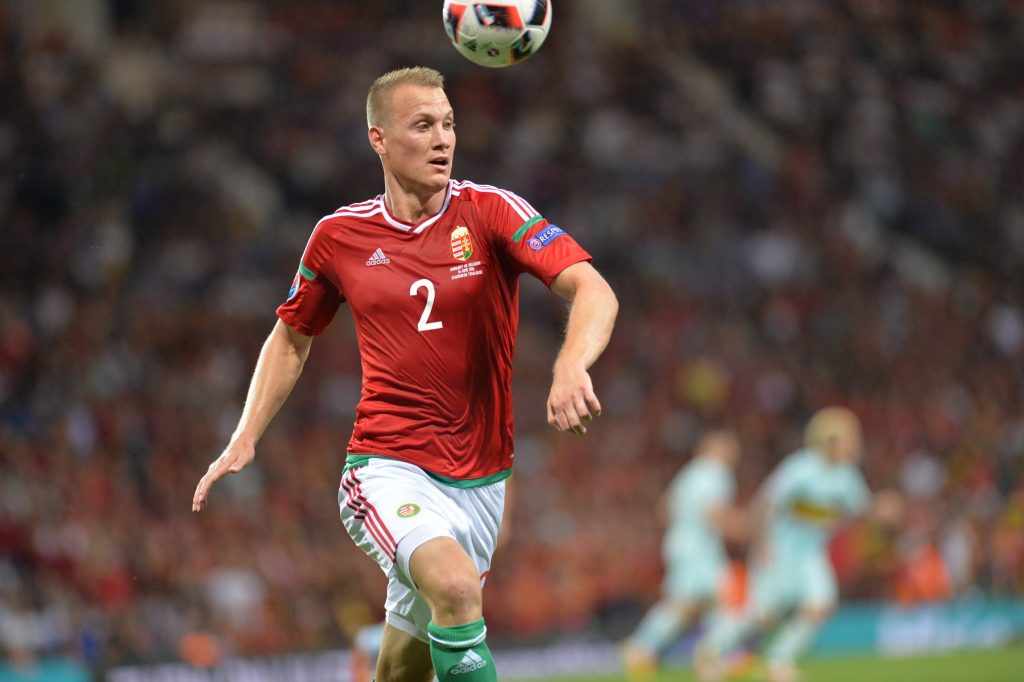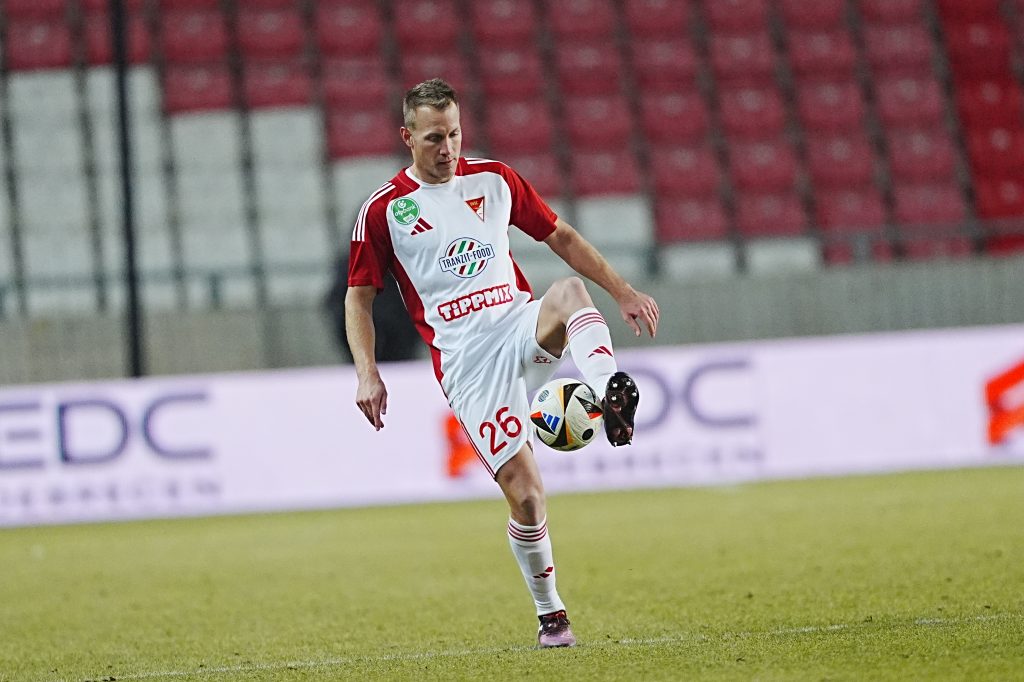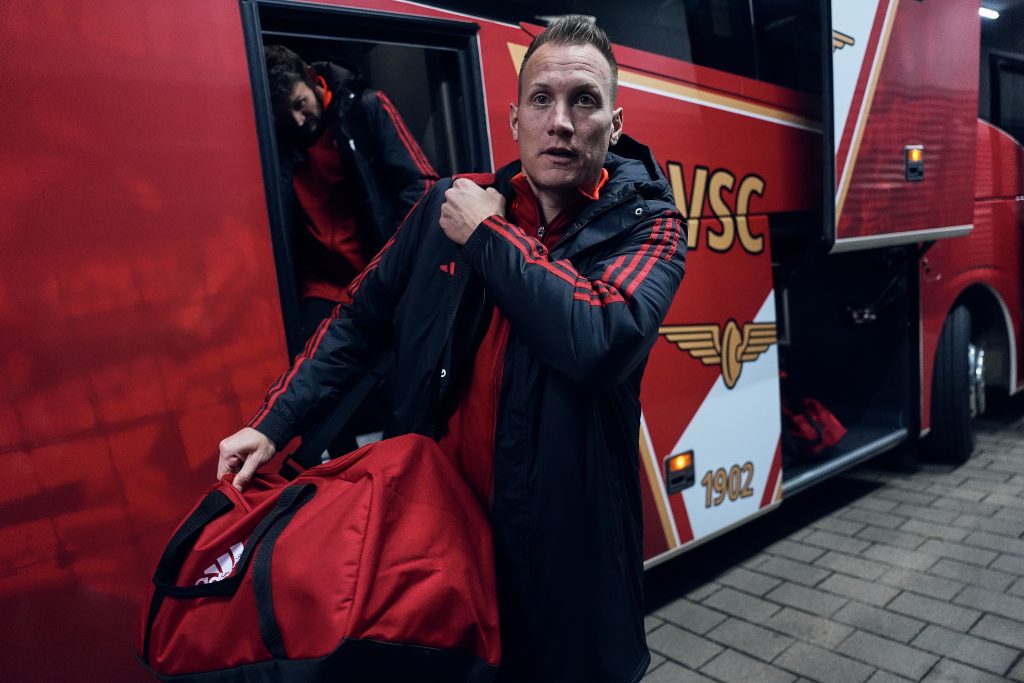

Published: 2025.02.19.

Ádám Lang, who can significantly contribute to our team’s performance, joined DVSC during the winter transfer window. The 32-year-old defender, who has won championship titles in Hungary, Romania and Cyprus, gave an interview to dvsc.hu, in which he talked about various topics, including his early days in swimming, his childhood self, his perspectives on life, Loki’s spring season, the European Championship and the role of defenders. In fact, we discussed The Shawshank Redemption, the film adaptation of Stephen King’s novella, featuring brilliant performances by Tim Robbins and Morgan Freeman.
– A 70-time capped Hungarian national team player and a responsible family man steps onto the pitch week by week in the colours of DVSC. Nevertheless, what kind of child was Ádám Lang?
– A mischievous, restless troublemaker. I was involved in everything, always looking for something to climb on. Back then, we didn’t have today’s technology, we weren’t glued to computers or game consoles. Instead, we hung out on the playgrounds and bushy areas between buildings in the housing estate of Veszprém where I lived until elementary school.
– How did football come into the picture?
– When I started elementary school, we moved to a residential area with family houses. At that time, traffic wasn’t as heavy as it is today, so we could play football in the streets. The displaced paving stones served as goalposts and we were playing football almost every day. If a car came, we stepped aside, then continued playing. I really enjoyed football and I felt that I was one of the bests on our street, yet I started with swimming. There were swimming lessons at school and I was good at it. I liked swimming and did it until upper elementary school. However, when I was 11, I walked up to my coach and told him, “I’m sorry, I love swimming and all, but from now on, I want to play football.” So that was it, I quit. My coach was surprised but said that if this was what I wanted, he was sorry to see me go but understood.
– At the age of 11 or 12, we have big dreams, but at that point, we can’t know what will happen to us or what the right decision is.
– That’s right. I watched the World Cup, the European Championship, the grand stage of football on TV and even the Hungarian first division seemed like a huge deal to me. I thought that it would be a huge achievement to get there. As I kicked the ball against the concrete wall in the street, I imagined myself being the one who scores a crashing goal into the top corner in a big match. Nevertheless, it’s a long journey. Only those who are in it know truly what this path entails. Take Ronaldo or Messi, for example. Everyone takes it for granted how many goals they score, how they dribble, but no one sees the immense work behind it. In today’s world, no one really cares how much effort you put in. They only look at whether you succeed or not, while the hard work behind the performance fades into the background. This career is beautiful and I’ve achieved results, but I still feel like it’s not enough for me. I live my life with the mindset of always setting new goals not just in football, but also as a family man.
– By the way, how big is the family?
– We have three kids, two boys and a girl. The eldest has just turned five, the middle one is about to turn four and the youngest one is two and a half. There’s always something to do and at time, it tests you, but they are the future. It’s my responsibility to pass on the knowledge and habits that will help them become valuable people and succeed in life.

– You managed to succeed at a very young age as after 44 years, the Hungarian national team qualified for the European Championship in France in 2016 and at the age of 23, you were a key player in the squad. How did you experience that?
– It was an emotional state in which I didn’t even think about where I was, who we were playing against or the atmosphere surrounding us. I simply lived in the moment and that put me in a mental state where I didn’t feel any pressure. We all approached it with a mindset of enjoying every match and every day we spent there because it was the first time in decades. It was a once-in-a-lifetime experience. The older players, like Bazsi (Balázs Dzsudzsák), Gabi Király, Roli Juhász and Zoli Gera had experienced serious disappointments before, but this time we made it, so they were also “flying”. The team had great harmony and balance.
– Indeed, back then, hopes became reality. It’s well known that the Shawshank Redemption is one of your favourite films. There are countless reasons why—it’s a masterpiece—but I have to ask: why does it resonate with you?
– The story really got to me. You have a successful man whose life takes a terrible turn, and he ends up in prison despite being innocent. He’s thrown into a world where he needs immense mental strength, where he has to go to a very deep in order to survive. Yet, he still finds a way out because no matter what happens to him, he stays strong inside and shapes his mindset in a way that helps him endure.
– Would you say that you are an optimist? Is the glass usually half empty or half full for you?
–I grew up in a certain environment, adopted habits and had a particular mindset, but at some point, I realized I didn’t really like it. I told myself that I had to change, and I could because our mind controls everything. Every decision is guided by our brain, so why not “program” it in a way that benefits us and supports our growth? Deep down, we all feel what’s right. Our emotions, anger and anxiety are visible on us physically. I started analyzing these processes and worked hard to minimize negative feelings in tough situations, to stop wasting time and energy on things that don’t really matter. Sometimes, I had to figuratively slap myself and say, “Wake up, your thoughts are heading in the wrong direction.” It wasn’t easy, but I managed to change my inherited way of thinking. It’s something that you can learn. Complaining never moves anything forward.

– You also seem to radiate this kind of presence on the pitch. You position yourself confidently, you’re excellent in duels, and you read the game well. Is that instinct, a natural gift, or something you’ve developed over the years?
– It’s a very complex thing, you need some instinct for it, too. For example, when I went to my first training session and they asked me what position I wanted to play, I said winger. They put me there, but I had no clue what I was doing, I just didn’t have a feel for it. In the next session, they moved me to the back and I could instinctively read whether a cross or a shot was coming and where the ball would go. Nevertheless, hard work is essential! Repetition and developing muscle memory are crucial because many situations repeat themselves during matches. Everything is constantly changing, but there are fundamental football principles you have to learn. You also need to work on position-specific skills—it’s a bit like memorizing a poem in school; you have to know it by heart. Of course, let’s not forget there’s an opponent on the pitch, too. They might pull something unexpected that you can’t prepare for. There’s no book titled 500 Football Solutions for Everything… In those moments, you have to react quickly, ideally with a cool head, minimizing the stress factor as much as possible.
Intelligence is also important as defenders have a unique vantage point from the back, allowing us to read the game in ways others can’t. Ultimately, we carry a huge responsibility. A striker can miss 10 chances, but if we make one mistake, people immediately point and say, “Look, what does this idiot is doing?” Our job is primarily to protect the goal and there’s little room for even the slightest lapse in concentration. It’s a massive responsibility, but I love it. I’m a perfectionist— even if everyone pats me on the back saying I played great, I’m never fully satisfied.
– A few weeks have passed, and you’ve now settled in at Loki and in Debrecen. How do you feel here, both as a footballer and in your personal life?
– Family life is all good—we found a house, we found a suitable kindergarten, which is very important. The kids love it so much they don’t even want to come home, so overall, the picture is very positive. When I leave for training, I know my children are safe and happy, which means a lot to me.
From a professional perspective, I knew exactly where I was coming, I understood the situation. As soon as I arrived, even in the first few training sessions, I could see that—regardless of what happened in the fall—a new chapter was beginning here. From the intensity of the sessions and the players’ attitude it was clear that the spring season would be different. We have a gap to make up, but I’m thinking long-term. I’m absolutely satisfied with the conditions, the atmosphere in the dressing room, and I fully align with the coach’s vision as we think alike.
The two victories were crucial. The ending of the match against Puskás turned out the way it did, but we have to keep looking forward. I have no fear when it comes to reaching our goals. I see the work, the commitment—maybe the key mentally is to remember that while every match is important, we shouldn’t let the pressure become overwhelming. Everyone needs to be able to fully express themselves in those 90 minutes. We are here for each other, and we can support one another.

Pictures: DVSC, mlsz.hu